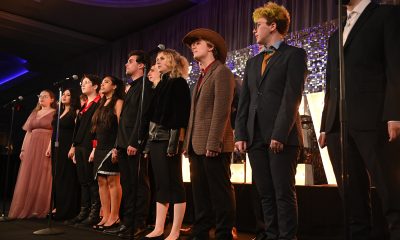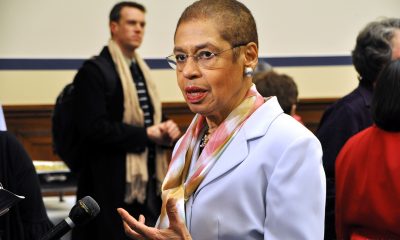District of Columbia
Gay D.C. Council candidate Parker wins by wide margin
McDuffie leads Silverman for ‘non-Democratic’ at-large Council seat
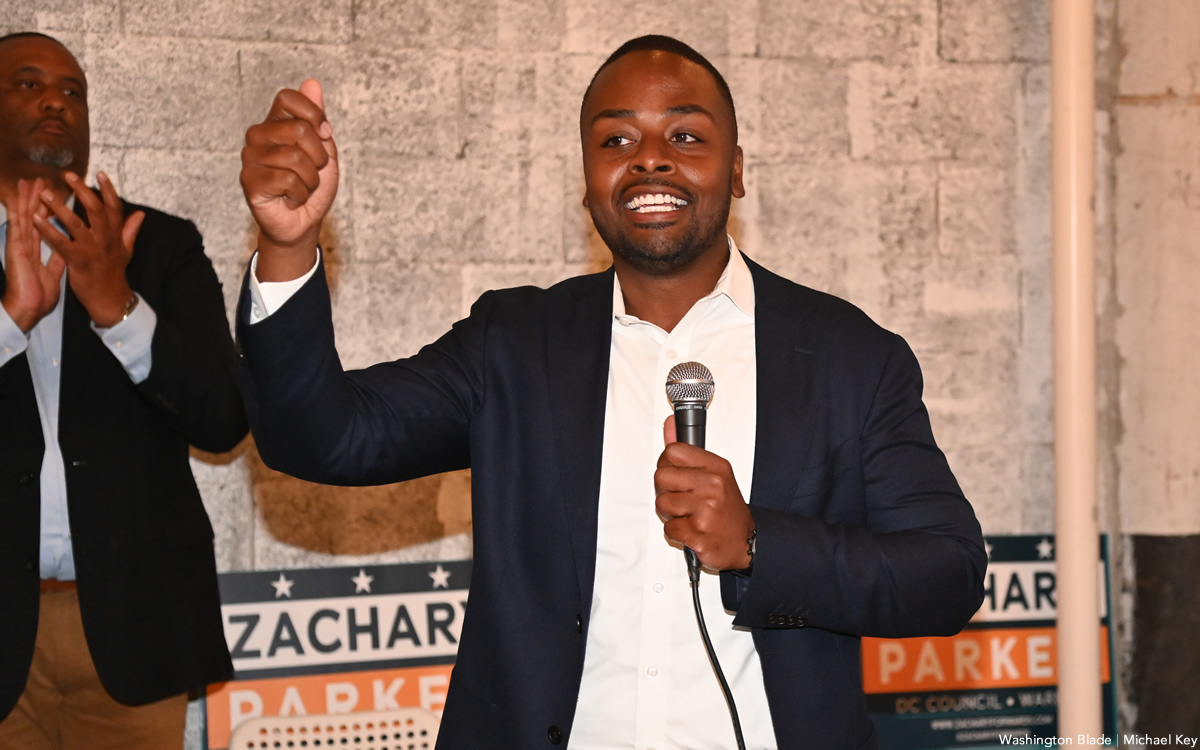
Ward 5 D.C. Council candidate Zachary Parker, who won the Democratic primary in June in a hotly contested seven-candidate race, won election to the Ward 5 Council seat on Tuesday by a wide margin, clearing the way for him to become the first openly gay member of the Council since 2015.
With the D.C. Board of Elections saying all but some remaining mail-in and drop-box ballots had been counted at around 11 p.m. on Tuesday, Parker had 93.67 percent of the vote compared to his Republican challenger, Clarence Lee Jr., who had 5.57 percent of the vote.
“Although they say the Democrat usually takes it in the general election, I didn’t want to take anything for granted,” Parker told the Washington Blade at his election night victory party. “So, I ran just as hard in the general as I did in the primary, because Ward 5 deserves it,” he said.
About 150 people turned out for the Parker victory party, held at the Cotton and Reed distillery and tavern located next to Ward 5’s bustling Union Market. Those who attended and who cheered loudly as Parker delivered his victory speech reflected the diverse coalition of Ward 5 residents, including many seniors, who worked on Parker’s campaign.
“Ward 5 is a melting pot. It’s a microcosm of the city,” he told the Blade. “And it’s incumbent on me to represent all of the interests of Ward 5 residents. It’s a duty that I’m honored to have, and I look forward to the challenge.”
Parker was among nearly all the Democratic candidates, including D.C. Mayor Muriel Bowser, D.C. Council Chair Phil Mendelson, and the Democrats running in Wards 1, 3, and 6 who were far ahead of their challengers and expected to be declared winners.
Also winning in a decisive vote was Initiative 82, the ballot measure calling for ending the city’s tipped wage system by raising the lower minimum wage for tipped workers, currently at $5.25 per hour, to the full city minimum wage, currently at $16.10 per hour, over the five-year phase-in period.
As of Tuesday evening, the “yes” vote on Initiative 82 received 74.1 percent of the vote, with the “no” vote receiving 25.9 percent.
Several of the city’s gay bar owners and a number of LGBTQ tipped workers expressed strong opposition to the initiative, saying it would lower the earnings of tipped workers, most of whom, they say, earn far more than the city’s full minimum wage. But many of the city’s LGBTQ activists supported the initiative on grounds that all workers should receive the same full minimum wage.
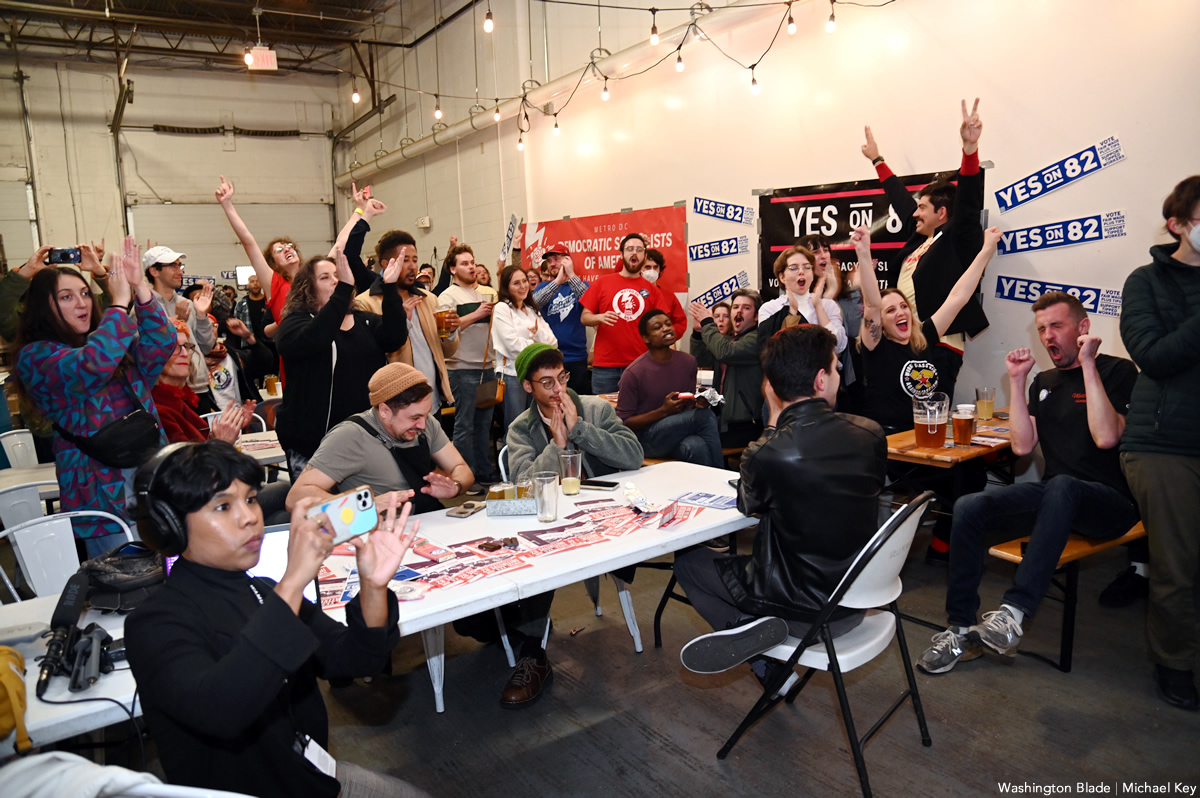
The only race on the D.C. election ballot that appeared too close to call as of Tuesday evening was the race for the so-called non-Democratic at-large D.C. Council seat. Two of the city’s four at-large Council seats were up for election this year, with voters allowed to vote for two candidates. A total of eight candidates were on the ballot for the at-large seats, including incumbent Democrat Anita Bonds and incumbent independent Elissa Silverman.
Incumbent Ward 5 Council member Kenyan McDuffie, a Democrat who switched to become an independent, was also among the contenders for one of the two at-large seats.
As of Tuesday evening, Bonds was in first place and the presumed winner of her seat with 32.02 percent of the vote. McDuffie was in second place with 22.16 percent, ahead of Silverman, who was in third place with 18.78 percent of the vote.
Of the remaining candidates, independent Graham McLaughlin had 10.02 percent, Statehood Green Party candidate David Schwartzman had 5.15 percent, Republican Giuseppe Niosi had 4.02 percent, independent candidate Karim Marshall had 4.96 percent, and Independent Fred Hill had 2.36 precent.
Although McDuffie was ahead of Silverman by 8,925 votes, most political observers were reluctant to declare him the winner with an undetermined number of mail-in and drop box ballots yet to be counted.
The D.C. Board of Elections has yet to officially certify any of the races. Mail-in ballots postmarked by Nov. 8 will be allowed to be counted if they are delivered by Nov. 15 under Board of Elections rules. Board of Elections spokesperson Nicholas Jacobs said the board also had yet to count ballots placed in citywide drop boxes on election day.
The Associated Press, however, declared Bowser the winner, confirming her historic role of becoming the first woman to be elected to a third term as mayor of D.C.
At around 11 p.m. Tuesday night, Bowser had 74.5 percent of the vote, far ahead of her independent rival Rodney Red Grant, who had 14.8 percent and Republican rival Stacia Hall, who had 6.01 percent of the vote. Libertarian Party candidate Dennis Sobin had 1.3 percent of the vote.
As expected, two other gay candidates on the Nov. 8 D.C. ballot fell short of wining their respective races. Gay Libertarian candidate Bruce Majors had just 2 percent of the vote as of Tuesday evening in his race for the position of D.C. delegate to the House of Representatives. Incumbent Eleanor Holmes Norton, a longtime LGBTQ rights supporter, had 86.28 percent of the vote. Republican Nelson Rimensnyder had 6.05 percent and Statehood Green Party contender had 4.0 percent of the vote.
The other out gay candidate, Adrian Salsgiver, also ran as a Libertarian Party candidate for the Ward 3 D.C. Council seat. He had 1.1 percent of the vote compared to Democrat Matthew Frumin, who had 74.9 percent of the vote. Republican candidate David Krucoff had 23.58 percent of the vote.
In the D.C. Council Chair race, Mendelson had 81.8 percent of the vote compared to Statehood Green Party candidate Darryl Moch, who had 9.5 percent and Republican challenger Nate Derenge, who had 7 percent.
In the Ward 1 D.C. Council race, incumbent Democrat and longtime LGBTQ rights supporter Brianne Nadeau had 79.5 percent of the vote. Her Statehood Green Party opponent, Chris Otten, had 17.5 percent.
Ward 6 D.C. Council member Charles Allen, who ran unopposed, had 93.6 percent of the vote, with 6.38 percent going to one or more write-in candidates, according to election returns.
Also running unopposed was D.C. Attorney General candidate Brian Schwalb, a Democrat, who had 97.4 percent of the vote, with 2.59 percent going to write-ins.
LGBTQ activists in D.C. have pointed out that unlike many states across the country, where far-right Republicans are using LGBTQ rights, especially transgender rights, as a wedge issue to attack the LGBTQ community, in D.C., for close to 20 years, all candidates with any chance of winning have been strong supporters of LGBTQ rights, including Republicans and independents.
Because of that near universal support, as longtime D.C. LGBTQ rights activist Earl Fowlkes put it, LGBTQ voters have the luxury of deciding who to vote for based on non-LGBTQ issues. And in a city where the overwhelming majority of voters, including LGBTQ voters, are Democrats, the distinction between Democratic candidates who compete in Democratic primaries has been moderate Democrats versus progressive farther left Democrats.
Parker, whose positions have placed him in the progressive left faction of the party, appears to have drawn support from the moderate faction of Democratic voters after he won the Democratic primary, according to Ward 5 political observers.
Among the moderate independents who backed Parker this year is gay former D.C. Councilmember David Catania.
“I like Zachary very much,” Catania told the Blade. “I’ve had the opportunity to meet with him, to help fundraise for him. I’m enormously proud of him,” Catania said. “And I think he is going to be an extraordinary leader.
Catania spoke about Parker while he attended the election night victory party for Mayor Bowser. Catania ran unsuccessfully against Bowser as an independent when she first ran for mayor in 2014. Carol Schwartz also ran that year as an independent.
Sporting a Bowser for Mayor sticker on his shirt, Catania said he and the mayor have the strongly held view that those who compete against one another in elections should join forces to support the needs of citizens after the election is over.
“The mayor and I certainly have done this,” Catania said. “After she was victorious, she reached out to me to serve on a number of commissions and to chair a board and so on and so on,” he said. “And I made a promise the night that I lost,” he said. “I made all my supporters raise their hands and promise to support her.”
District of Columbia
GenOUT Chorus offers solace, strength to LGBTQ teens
Summer camp held from June 23-27
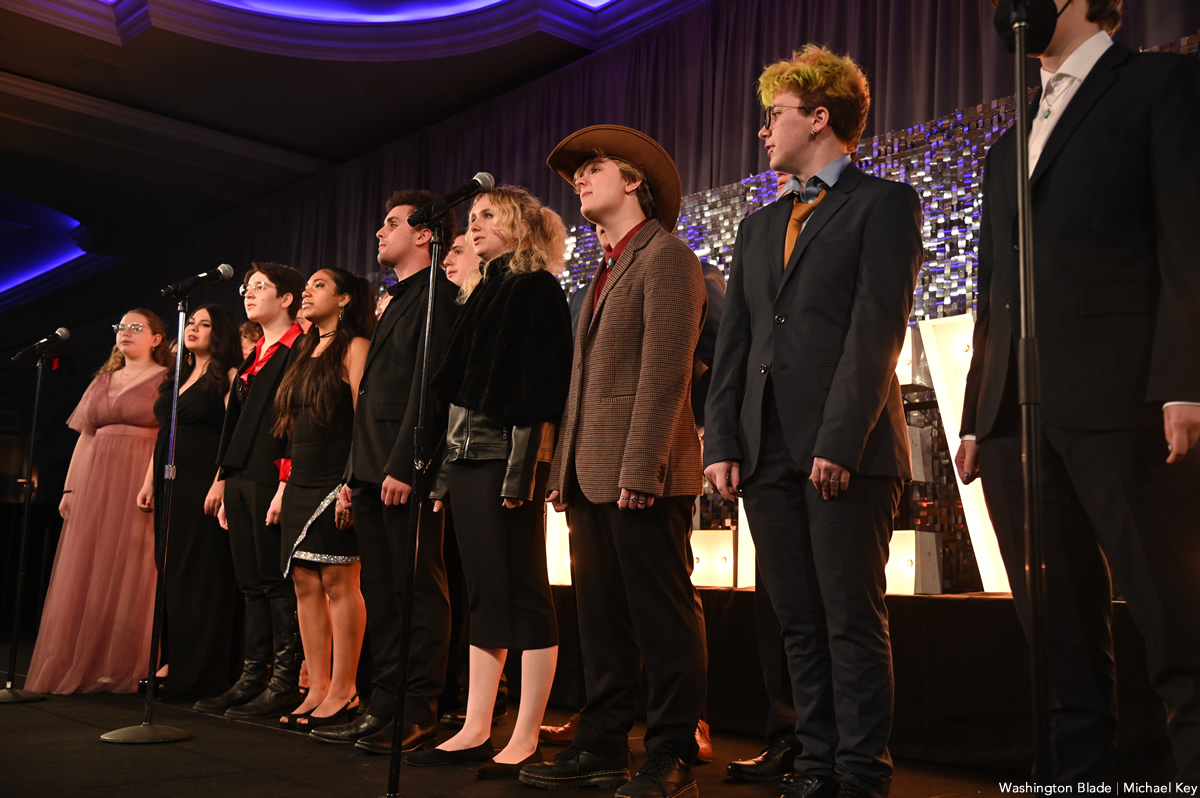
As Pride month draws to a close and Washington begins to take down its rainbow flags and WorldPride decorations, it can be easy to confine the ideas of LGBTQ liberation to June. One historic organization in Washington has been speaking out — or singing out if you will — to ensure that LGBTQ youth are allowed to explore and be themselves every month of the year.
The Gay Men’s Chorus of Washington is one of the oldest and largest LGBTQ choruses in the world. With more than 300 members and more than 40 years in the D.C. LGBTQ community, to say it is an institution would be an understatement.
Beginning in 1981, following an inspiring performance by the San Francisco Gay Men’s Chorus at the Kennedy Center, a group of 18 gay men — led by a “straight” woman and friend of Washington’s gay community, Marsha Pearson — created the GMCW. Since its establishment the organization has only grown in number and relevance within the city. From hosting multiple concerts a year, international equality trips, and creating a dedicated space to “inspire equality and inclusion with musical performances and education,” the GMCW is one of the cornerstone organizations in the Washington LGBTQ community.
One of the most remarkable parts of the GMCW is its youth outreach program and choir: GenOUT. The outreach ensemble specializes in providing a space for Washington’s LGBTQ and allied youth, ages 13-18, to find their voice through song and connect that voice to community. The GenOUT program has been around since 2001, and since 2015 has provided a platform for their voices to be heard — literally — making it the first LGBTQ youth chorus in the Washington area.
The Washington Blade sat down with GenOUT Director C. Paul Heins and member Ailsa Ostovitz to discuss why GenOUT, and more specifically the GenOUT summer camp, which was held from June 23-27, has become an essential space for LGBTQ youth in the D.C. area to find their voice amid less-than-supportive administration and rising anti-LGBTQ rhetoric in the nation.
“This is my 11th season with GenOUT, and also the 11th season with Gay Men’s Chorus of Washington,” Heins said when explaining how he ended up in the director role for the self-selected, no audition required youth outreach ensemble. “I was hired in August of 2014 to start GenOUT. I spent that first fall researching other choruses, figuring out the infrastructure, promoting the chorus, and building relationships with schools, organizations, and faith communities. And then we started in January of 2015 with nine brave singers and since then, we’ve had 150+ singers from 80 or more schools in the DMV participate.”
Ailsa Ostovitz, on the other hand, being in high school had not had as much experience with choirs — yet her commitment and unwavering passion for the work she — and the other performers within GenOUT provide to each other was unmistakable.
“I’ve been a part of the course since April of 2022, and that was like seventh grade— which is wild to think about,” Ostovitz said when reflecting on how long she had been a part of GenOUT. She explained how she had begun to develop a drive for filling leadership roles within GenOUT after gaining valuable experiences and education from the organization.
“This is my first year in leadership,” she added. “The rest of the years, I kind of hung back. I really wanted to — especially last season — kind of put myself in the position of a peer and think ‘What would I want from people that are supposed to represent me to the adults? What would I want out of that?’”
And with those questions in mind, Ostovitz explained she buckled down and worked hard to get to where she is now as a member of the leadership team within the GenOUT choir.
“I spent a lot of time working with my section leader, and, looking up at him and being like, ‘What are you doing now that I can do in the future?’ And so this year, I ran for leadership,” Ostovitz said. “I got section leader, and that was cool. I’ve just spent a lot of time — most of my time in this course — learning leadership skills to kind of help me in all sorts of things in life, because I like to take control of things, and I like doing stuff.”
These leadership skills are just a handful of the things that students like Ostovitz learn while participating in the program. This year’s theme was “Make Them Hear Us!: Empowering LGBTQ+ and Allied Youth Through Music, Media, and Community,” and provided multiple opportunities for GenOUT’s members to engage with new concepts, ideas, and experiences.
From field trips to mentoring opportunities to an end-of-camp performance, it becomes clear when speaking to those familiar with the GenOUT experience: it is not your traditional summer day camp.
“The title of the camp references the anthem that GMCW has sung for many years,” Heins said. “‘Make Them Hear You’ from the musical ‘Ragtime’ encourages us to share important stories — stories that honor the fights that we’ve been fighting, the rights that we have won, affirmations that we seek for every human being, and the focus on media — specifically developing young people’s understandings of the kinds of media that they can access and use to share their voice.”
The camp offers singing and dancing lessons, creative writing exercises, LGBTQ+ history lessons, and open discussions about identity — providing an outlet for students to figure out who they want to be and find their voice.
“What this camp does, I believe, is it helps foster young people’s voices and not only encourages them to to speak, but to give them the skills to speak in a way that will be heard meaningfully,” Heins added. “I have noted that youth in queer choruses like GenOUT have said that singing in a chorus allows young people to express themselves more honestly and with greater passion than other forms of expression. They’ve also said that singing with others that understand you on a very deep, profound level, makes the expression much easier and more beautiful. I think that experience is what really makes this a special opportunity for young, LGBTQ and allied people.”
Ostovitz echoed Heins’s sentiment, emphasizing that the space GenOUT provides allows her to feel empowered in ways more than by creating leadership skills that will help her later in life. GenOUT has allowed for her to see the humanity and similarities LGBTQ youth all face in a straight world.
“Joining the chorus and being in this camp, it really gives people a chance to see that every person is going through the same experience you are, on a level of finding your own identity and being confident in that,” Ostovitz said. “It really, really serves a purpose by showing there are still queer people. They’re not fizzling out — young people are queer. We want to use our voices to express what we feel and how things are affecting us, and I think that using music to do that is probably one of the most powerful ways to do that.”
In addition to allowing for internal growth and honing their singing abilities, both Ostovitz and Heins pointed out the other valuable skills students learn while in the GenOUT program. Ostovitz explicitly highlighted the mentorship program GenOUT has with GMCW, and how it has helped students like her figure out their future.
“Because we are so connected with GMCW, we run a mentorship program where, if you want to explore career, identity, whatever, we can connect you with somebody from GMCW,” Ostovitz said. “You get to spend a whole semester with a person working on your voice or your career or your what you want to do in higher education. It’s not only for things related to your queer identity, but it’s also just for life. It’s really cool.”
This year’s theme, centering around media and the many ways people can share their voice, was highlighted through the camp’s field trips to two legacy media organizations — WAMU and NBC Washington — and a discussion with staff from the Washington Blade, including Publisher Lynne Brown and International News Editor Michael K. Lavers.
“GenOUT provides a chance to get to know people from all around this area, but it also connects you to older folks, It connects you to people from the past, as well as we learn about LGBTQ history,” Heins said. “I think a camp specific thing is we want young people to understand how they can share their stories beyond just talking to their friends. There are these forms of media that are out there to share your stories, to have your voices heard, and to have a sense that these media are there for everyone. It’s not just a thing for people aged 21 and over. That was something that Lynne and Michael from the Blade were sharing with; that anyone can write in a letter to the editor. It doesn’t mean it’s going to be published, but that anyone has that opportunity. And I think that’s a great way for them to say the Blade is open to you to share your voice.”
The concept that there are people who want to, or may need to hear queer voices represented is one that is not lost on Ostovitz.
“There is something Thea says that has kind of integrated into our chorus — that someone out there needed to hear you, needed to hear your voice, needed to hear your story,” Ostovitz said. “That’s something that I kind of live by in this chorus, where I’m like, ‘I believe that there is someone out there that needed to hear this song for whatever reason, whatever it did for them. And I’m hoping to learn how much more can this chorus do for not just our little community, but how much more can it do around the world or the country — especially now.”
Living in the political center of the U.S., Ostovitz explained, has impacted how she approaches her identity, her education, and the urgency of using her voice — both as a student and as a young queer person navigating an increasingly hostile national climate.
“Being so close to the political center of the country and also a student at the same time has not been the easiest thing in the world as of late,” she said. “You’re thinking a lot about ‘Oh, I wonder if this program in my school will still exist next year,’ because a lot of the funding for physics and science programs in general has been cut. So I’m fortunate enough that Maryland has been pretty good about going against this administration. And so being in this chorus gives me a second to step back from my academics and just go somewhere for the two hours of rehearsal.”
For Ostovitz, just having those two short hours a week to focus on music — without thinking about the political climate that paints her and her choir peers as nefarious for being LGBTQ — provides solace.
“Everybody else is going through the same thing as I am, but we’re all also working towards the same goal, which is acceptance and uplifting of everybody and everyone — no matter who they are,” she said. “It kind of settles you down and grounds you. And then you just make music with people, and it’s really like a stress reducer for me.”
“Is it too trite to say that that would make people feel less alone, knowing that it’s not just a DMV thing, but that there are queer people all over?” Heins asked Ostovitz.
“No, it’s not — for sure,” Ostovitz responded. “It was a bit eye-opening.”
“A lot of us are fortunate enough to have families that support us enough to trust us and help us be passionate and mean what we do with the work that we do in this chorus — because it is optional,” Ostovitz added. “It is optional to have the courage that we have to practice and commit as much as we do, and the fact that we have a whole organization backing us on that is pretty cool.”
“We often say that we sing for those who can’t sing in a chorus like ours,” Heins said. “We sing for people who don’t have the freedom or the option to live their authentic lives. I think that’s very powerful.”
“It’s a very unique experience to be surrounded by so many people that get it,” Ostovitz said. “It’s a very joyful experience when we perform our big shows at the Lincoln Theater, being part of that production is also a very unique experience. So I think everything about this chorus is very joyfully unique.”
“I feel very proud, and I feel very inspired,” Heins said. “I feel inspired by the young voices. I feel a sense of inspiration in my own music-making, when I am able to take a piece from its very beginning all the way to the stage in a polished form. And I feel that sense of pride in knowing that I’ve helped this group of young people develop their confidence to do really amazing things.”
“GenOUT sang 22 times last year, which for any chorus is a big deal, but for a youth chorus coming from thither and yon, it is really a big deal,” Heins added. “I’m just really inspired and proud, and know that when I am in a nursing home somewhere and these folks are still out working and I know the country will be in good hands.”
District of Columbia
Activists protest outside Hungarian Embassy in DC
Budapest Pride scheduled to take place Saturday, despite ban

More than two dozen activists gathered in front of the Hungarian Embassy in D.C. on Friday to protest the country’s ban on Budapest Pride and other LGBTQ-specific events.
Amnesty International USA Executive Director Paul O’Brien read a letter that Dávid Vig, executive director of Amnesty International Hungary, wrote.
“For 30 years Budapest Pride has been a celebration of hope, courage, and love,” said Vig in the letter that O’Brien read. “Each march through the streets of Budapest has been a powerful testament to the resilience of those who dare to demand equality, but a new law threatens to erase Pride and silence everyone who demands equal rights for LGBTI people.”
“The Hungarian government’s relentless campaign against LGBTI rights represents a worrying trend that can spread normalizing division and hatred,” added Vig. “Thank you for standing with us when we refuse to be intimidated.”
Council for Global Equality Chair Mark Bromley and two of his colleagues — Stephen Leonelli and Keifer Buckingham — also spoke. Health GAP Executive Director Asia Russell and Chloe Schwenke, a political appointee in the Obama-Biden administration who worked for the U.S. Agency for International Development, and Planned Parenthood staffers are among those who attended the protest.
(Washington Blade video by Michael K. Lavers)
Hungarian lawmakers in March passed a bill that bans Pride events and allow authorities to use facial recognition technology to identify those who participate in them. MPs in April amended the Hungarian constitution to ban public LGBTQ events.
Budapest Pride is scheduled to take place on Saturday, despite the ban. Hundreds of European lawmakers are expected to participate.
“Sending strength to the patriotic Hungarians marching tomorrow to advance human dignity and fundamental rights in a country they love,” said David Pressman, the gay former U.S. Ambassador to Hungary, on Friday on social media.
Sending strength to the patriotic Hungarians marching tomorrow to advance human dignity and fundamental rights in a country they love. Szabadság és szerelem. My past remarks on Budapest Pride: https://t.co/y1QhA9QouA
— David Pressman (@AmbPressman) June 27, 2025
District of Columbia
Man sentenced to 15 years in prison for drug deal that killed two DC gay men
Prosecutors asked for 210 month sentence

On Thursday Jevaughn Mark, 33, of D.C., was sentenced to 180 months in federal prison for running what prosecutors called a “prolific drug delivery service” that led to the fentanyl overdose deaths of two men in D.C.’s gay community.
The 15-year sentence comes three months after Mark, aka “Ledo,” pleaded guilty to conspiracy to distribute 40 grams or more of fentanyl and 500 grams or more of cocaine, as well as unlawful possession of a firearm by a felon. As part of the plea deal, Mark accepted responsibility for causing the deaths of Brandon Román and Robert “Robbie” Barletta. U.S. District Court Judge Tanya S. Chutkan also ordered five years of supervised release following his prison term.
Prosecutors from the U.S. Attorney’s Office for the District of Columbia argued that Mark knowingly sold fentanyl and was at least partially responsible for the men’s deaths. The office had asked the court for a 210-month sentence.
On Dec. 27, 2023, Román, 38, and Barletta, 28, were found unconscious in their Northwest Washington home after a 911 call brought police and emergency responders to the scene. A police investigation later revealed that Román had purchased what he believed was ketamine from Mark. DEA testing of the remaining drugs found no ketamine — only fentanyl, xylazine, and caffeine.
Friends and family members wore rainbow ribbons in solidarity with Román, a prominent D.C. attorney and LGBTQ rights advocate, and Barletta, a historic preservation expert and home renovation business owner — both of whom were active members of Washington’s gay community.
“There is no good outcome here,” Chutkan said from the bench before issuing the sentence. “These people didn’t deserve to die.”
While noting Mark’s “long record,” Chutkan opted for a sentence shorter than what the government had requested, citing what she believed to be genuine remorse.
“I believe Mr. Mark when he wishes he could take it back,” she said.
Following the sentencing, the Washington Blade spoke with Jeanine Pirro, the recently appointed U.S. Attorney for D.C., who echoed the judge’s compassion, but stood by her office’s push for a longer sentence.
“We had asked for more time,” Pirro said. “He’s a felon in possession, and there’s the fentanyl. But he’s got a prior record. There are various other crimes. This guy’s been operating with impunity.”
“My job is to make sure we recognize both Brandon and Robbie with dignity,” she added. “They are two very special human beings who should not have died — and they died as a result of not only someone else’s criminal behavior, but someone else’s reckless behavior in ignoring what he should not have ignored.”
DEA Special Agent in Charge Ibrar Mian emphasized the broader dangers of the drug trade in a written statement.
“The drug market is characterized by the illegal availability of polydrug mixtures, many of which have lethal amounts of fentanyl,” Mian said. “Criminals like Mr. Mark pose a deadly threat by selling drugs with fentanyl, which users unknowingly consume, often leading to their deaths. Illegal drug distribution affects the very foundations of our families and communities, so every time we take criminals like Mr. Mark off the streets, lives are saved.”
Mian also credited the DEA teams, USAO-DC litigators, and local and state partners for their work in investigating and removing “illegal drugs from this individual who was involved in violent activities.”
Asked whether she had a message for the LGBTQ community — statistically more vulnerable to substance use disorders than the general population — Pirro was direct about her commitment to equal justice.
“The only thing I can say to the LGBT community is that there is a level playing field here,” Pirro said. “Everybody gets the same justice. You have a problem, you have an issue, you come to me. I have a long history of fighting for equal rights for everyone. Everyone deserves dignity, everyone deserves protection, and everyone deserves justice — and you’re gonna get that from me.”
-

 U.S. Supreme Court5 days ago
U.S. Supreme Court5 days agoSupreme Court upholds ACA rule that makes PrEP, other preventative care free
-

 U.S. Supreme Court5 days ago
U.S. Supreme Court5 days agoSupreme Court rules parents must have option to opt children out of LGBTQ-specific lessons
-
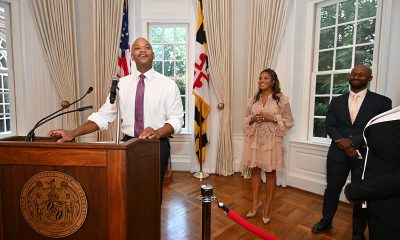
 Maryland5 days ago
Maryland5 days agoWes Moore hosts annual Pride reception
-

 District of Columbia5 days ago
District of Columbia5 days agoActivists protest outside Hungarian Embassy in DC

